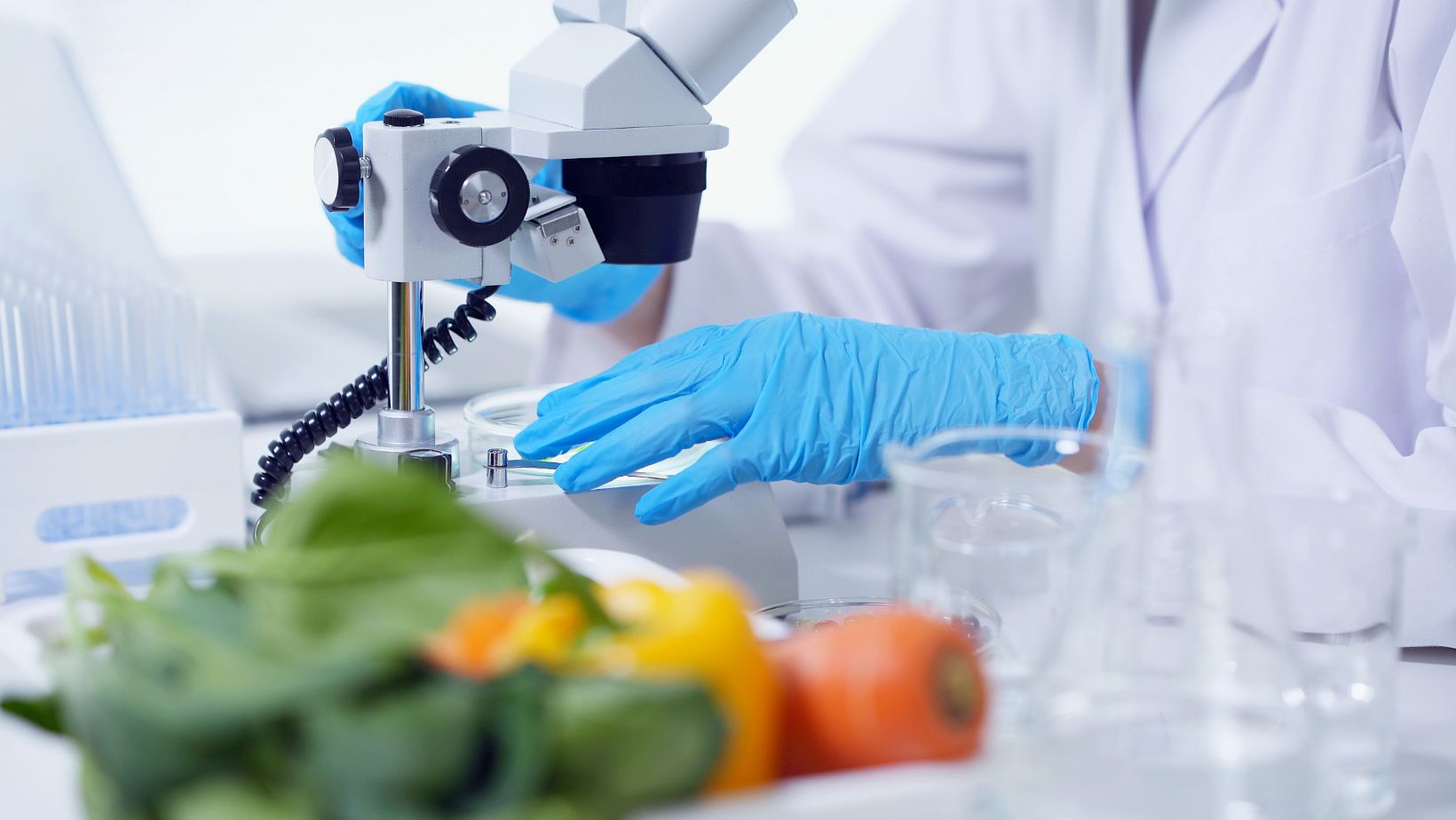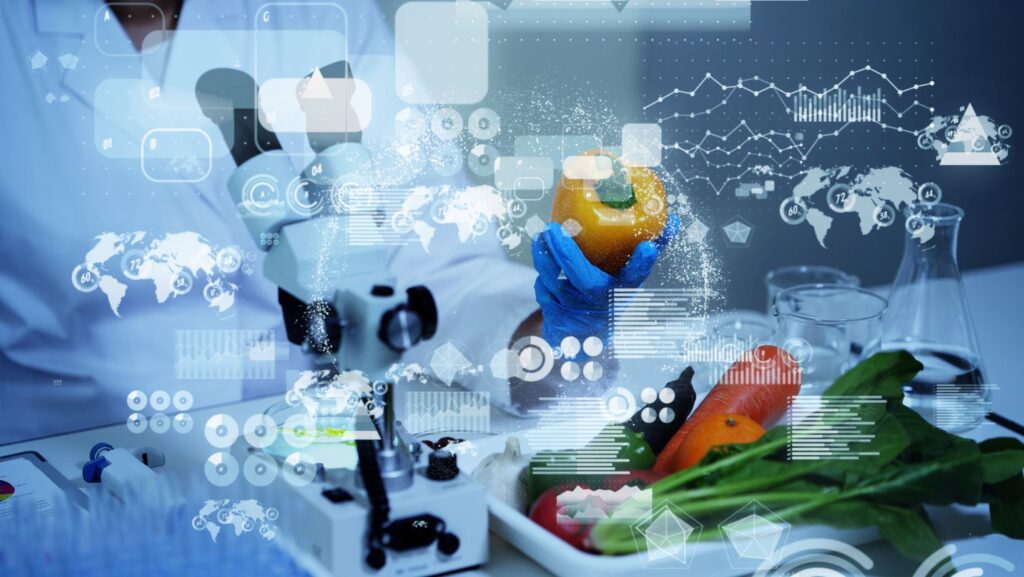
In the ever-evolving world of food science and technology, new trends continually reshape how we think about, produce, and consume our food. From lab-grown meat to AI-driven food processing, the innovations are not only exciting but also promise significant impacts on sustainability, health, and food security. These advancements reflect a growing synergy between technology and culinary science, driving forward a future where food is more personalized, sustainable, and accessible.
Trends in Food Science & Technology
Plant-Based Protein Innovations
 In response to consumer demands for sustainable and ethical options, plant-based protein innovations have revolutionized food markets. Companies utilize advanced biotechnology to develop proteins that not only mimic the texture and taste of animal products but also enhance nutritional profiles. For example, the use of fermentation technology aids in producing heme, a compound that gives plant-based burgers a meat-like flavor and appearance. These innovations not only attract vegetarians and vegans but also meat-eaters seeking healthier, sustainable alternatives.
In response to consumer demands for sustainable and ethical options, plant-based protein innovations have revolutionized food markets. Companies utilize advanced biotechnology to develop proteins that not only mimic the texture and taste of animal products but also enhance nutritional profiles. For example, the use of fermentation technology aids in producing heme, a compound that gives plant-based burgers a meat-like flavor and appearance. These innovations not only attract vegetarians and vegans but also meat-eaters seeking healthier, sustainable alternatives.
Food Waste Reduction Technologies
Food waste reduction is crucial, given global sustainability goals. New technologies aim to minimize food waste at various stages of the supply chain, from production to consumption. Innovations include intelligent packaging that extends the shelf life of fresh produce and AI-powered systems that optimize food inventory management in grocery stores and restaurants. These technologies ensure products are used efficiently and contribute to significant reductions in the overall carbon footprint of the food industry. Additionally, apps that connect consumers to discounted food items nearing the end of their shelf life also play a vital role in reducing waste while providing economic benefits.
Impact of Biotechnology on Food Production
CRISPR and Genetic Editing
 CRISPR technology revolutionizes food production by enhancing crop traits and boosting yields. Developers use this gene-editing tool to remove undesirable traits and introduce beneficial ones, improving crop durability against pests and environmental stresses. For example, scientists have engineered rice varieties with increased resistance to drought and saltwater, thereby ensuring food security in vulnerable regions. Additionally, CRISPR helps in producing allergen-free foods; for instance, gluten-free wheat caters to individuals with celiac disease. These applications contribute to more resilient food systems and address nutritional challenges globally.
CRISPR technology revolutionizes food production by enhancing crop traits and boosting yields. Developers use this gene-editing tool to remove undesirable traits and introduce beneficial ones, improving crop durability against pests and environmental stresses. For example, scientists have engineered rice varieties with increased resistance to drought and saltwater, thereby ensuring food security in vulnerable regions. Additionally, CRISPR helps in producing allergen-free foods; for instance, gluten-free wheat caters to individuals with celiac disease. These applications contribute to more resilient food systems and address nutritional challenges globally.
Synthetic Biology in Food Ingredients
Synthetic biology transforms how food ingredients are developed and produced, focusing on sustainability and efficiency. It enables the creation of flavors, fragrances, and other compounds through controlled microbial processes, minimizing reliance on traditional agriculture and reducing environmental impacts. Companies now use engineered yeast and bacteria to produce vanillin, a key flavor component of vanilla, which lessens dependency on vanilla bean plantations. This approach not only helps conserve biodiversity but also stabilizes supply chains against the volatility of crop yields due to climate change. Through synthetic biology, manufacturers can meet consumer demand for natural and ethically produced food ingredients more effectively.
Smart Packaging and Food Safety
 Smart packaging plays a crucial role in enhancing food safety, a key trend in food science & technology. This innovative approach extends the shelf life of products, monitors freshness, and improves food safety through indicators that alert consumers about the condition of the food. Manufacturers incorporate sensors that detect pathogens or spoilage, ensuring products remain safe to consume. This technology aligns with recent advancements such as CRISPR for crop resilience and synthetic biology for ingredient sustainability, further emphasizing the importance of safety and healthiness in food consumption.
Smart packaging plays a crucial role in enhancing food safety, a key trend in food science & technology. This innovative approach extends the shelf life of products, monitors freshness, and improves food safety through indicators that alert consumers about the condition of the food. Manufacturers incorporate sensors that detect pathogens or spoilage, ensuring products remain safe to consume. This technology aligns with recent advancements such as CRISPR for crop resilience and synthetic biology for ingredient sustainability, further emphasizing the importance of safety and healthiness in food consumption.
Sustainability in Food Production
The strides in food science and technology not only promise more efficient food production but also ensure that these advancements align with the critical need for sustainability and health. As the sector continues to evolve, the focus on developing technologies that offer sustainable and healthy food options becomes increasingly important. With innovations such as smart packaging and biotechnological enhancements in agriculture, the future of food looks promising. These technologies are pivotal in meeting the growing global demand for food while addressing environmental concerns and ensuring food safety. As we move forward, it’s clear that the intersection of technology and food science will continue to play a crucial role in shaping a sustainable future.


